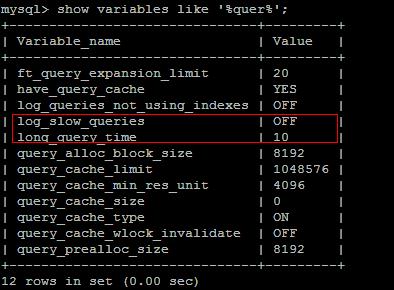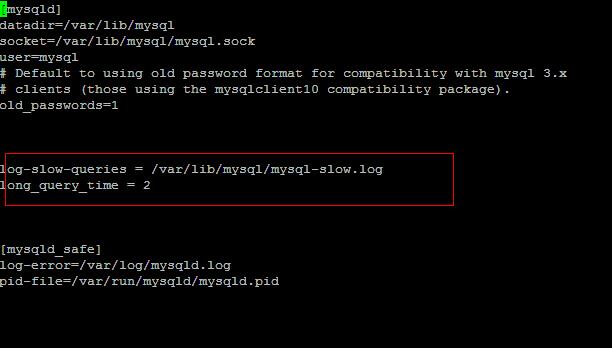mysql慢查询日志分析实例
1、MySQL 慢查询日志分析
pt-query-digest分析慢查询日志
pt-query-digest –report slow.log
报告最近半个小时的慢查询:
pt-query-digest –report –since 1800s slow.log
报告一个时间段的慢查询:
pt-query-digest –report –since ‘2013-02-10 21:48:59′ –until ‘2013-02-16 02:33:50′ slow.log
报告只含select语句的慢查询:
pt-query-digest –filter ‘$event->{fingerprint} =~ m/^select/i’ slow.log
报告针对某个用户的慢查询:
pt-query-digest –filter ‘($event->{user} || “”) =~ m/^root/i’ slow.log
报告所有的全表扫描或full join的慢查询:
pt-query-digest –filter ‘(($event->{Full_scan} || “”) eq “yes”) || (($event->{Full_join} || “”) eq “yes”)’ slow.log
2、将慢查询日志的分析结果可视化
Query-Digest-UI
其实,这是一个非常简单和直接的工具,浏览和统计Mysql慢查询,基于AJAX的Web界面。
配置Query-Digest-UI:
下载:
wget https://nodeload.gi**th*ub.com/kormoc/Query-Digest-UI/zip/master
unzip Query-Digest-UI-master.zip
查询分析结果可视化步骤如下:
1)创建相关数据库表
?
-- install.sql
-- Create the database needed for the Query-Digest-UI
DROP DATABASE IF EXISTS slow_query_log;
CREATE DATABASE slow_query_log;
USE slow_query_log;
-- Create the global query review table
CREATE TABLE `global_query_review` (
`checksum` bigint(20) unsigned NOT NULL,
`fingerprint` text NOT NULL,
`sample` longtext NOT NULL,
`first_seen` datetime DEFAULT NULL,
`last_seen` datetime DEFAULT NULL,
`reviewed_by` varchar(20) DEFAULT NULL,
`reviewed_on` datetime DEFAULT NULL,
`comments` text,
`reviewed_status` varchar(24) DEFAULT NULL,
PRIMARY KEY (`checksum`)
) ENGINE=InnoDB DEFAULT CHARSET=utf8;
-- Create the historical query review table
CREATE TABLE `global_query_review_history` (
`hostname_max` varchar(64) NOT NULL,
`db_max` varchar(64) DEFAULT NULL,
`checksum` bigint(20) unsigned NOT NULL,
`sample` longtext NOT NULL,
`ts_min` datetime NOT NULL DEFAULT '0000-00-00 00:00:00',
`ts_max` datetime NOT NULL DEFAULT '0000-00-00 00:00:00',
`ts_cnt` float DEFAULT NULL,
`Query_time_sum` float DEFAULT NULL,
`Query_time_min` float DEFAULT NULL,
`Query_time_max` float DEFAULT NULL,
`Query_time_pct_95` float DEFAULT NULL,
`Query_time_stddev` float DEFAULT NULL,
`Query_time_median` float DEFAULT NULL,
`Lock_time_sum` float DEFAULT NULL,
`Lock_time_min` float DEFAULT NULL,
`Lock_time_max` float DEFAULT NULL,
`Lock_time_pct_95` float DEFAULT NULL,
`Lock_time_stddev` float DEFAULT NULL,
`Lock_time_median` float DEFAULT NULL,
`Rows_sent_sum` float DEFAULT NULL,
`Rows_sent_min` float DEFAULT NULL,
`Rows_sent_max` float DEFAULT NULL,
`Rows_sent_pct_95` float DEFAULT NULL,
`Rows_sent_stddev` float DEFAULT NULL,
`Rows_sent_median` float DEFAULT NULL,
`Rows_examined_sum` float DEFAULT NULL,
`Rows_examined_min` float DEFAULT NULL,
`Rows_examined_max` float DEFAULT NULL,
`Rows_examined_pct_95` float DEFAULT NULL,
`Rows_examined_stddev` float DEFAULT NULL,
`Rows_examined_median` float DEFAULT NULL,
`Rows_affected_sum` float DEFAULT NULL,
`Rows_affected_min` float DEFAULT NULL,
`Rows_affected_max` float DEFAULT NULL,
`Rows_affected_pct_95` float DEFAULT NULL,
`Rows_affected_stddev` float DEFAULT NULL,
`Rows_affected_median` float DEFAULT NULL,
`Rows_read_sum` float DEFAULT NULL,
`Rows_read_min` float DEFAULT NULL,
`Rows_read_max` float DEFAULT NULL,
`Rows_read_pct_95` float DEFAULT NULL,
`Rows_read_stddev` float DEFAULT NULL,
`Rows_read_median` float DEFAULT NULL,
`Merge_passes_sum` float DEFAULT NULL,
`Merge_passes_min` float DEFAULT NULL,
`Merge_passes_max` float DEFAULT NULL,
`Merge_passes_pct_95` float DEFAULT NULL,
`Merge_passes_stddev` float DEFAULT NULL,
`Merge_passes_median` float DEFAULT NULL,
`InnoDB_IO_r_ops_min` float DEFAULT NULL,
`InnoDB_IO_r_ops_max` float DEFAULT NULL,
`InnoDB_IO_r_ops_pct_95` float DEFAULT NULL,
`InnoDB_IO_r_bytes_pct_95` float DEFAULT NULL,
`InnoDB_IO_r_bytes_stddev` float DEFAULT NULL,
`InnoDB_IO_r_bytes_median` float DEFAULT NULL,
`InnoDB_IO_r_wait_min` float DEFAULT NULL,
`InnoDB_IO_r_wait_max` float DEFAULT NULL,
`InnoDB_IO_r_wait_pct_95` float DEFAULT NULL,
`InnoDB_IO_r_ops_stddev` float DEFAULT NULL,
`InnoDB_IO_r_ops_median` float DEFAULT NULL,
`InnoDB_IO_r_bytes_min` float DEFAULT NULL,
`InnoDB_IO_r_bytes_max` float DEFAULT NULL,
`InnoDB_IO_r_wait_stddev` float DEFAULT NULL,
`InnoDB_IO_r_wait_median` float DEFAULT NULL,
`InnoDB_rec_lock_wait_min` float DEFAULT NULL,
`InnoDB_rec_lock_wait_max` float DEFAULT NULL,
`InnoDB_rec_lock_wait_pct_95` float DEFAULT NULL,
`InnoDB_rec_lock_wait_stddev` float DEFAULT NULL,
`InnoDB_rec_lock_wait_median` float DEFAULT NULL,
`InnoDB_queue_wait_min` float DEFAULT NULL,
`InnoDB_queue_wait_max` float DEFAULT NULL,
`InnoDB_queue_wait_pct_95` float DEFAULT NULL,
`InnoDB_queue_wait_stddev` float DEFAULT NULL,
`InnoDB_queue_wait_median` float DEFAULT NULL,
`InnoDB_pages_distinct_min` float DEFAULT NULL,
`InnoDB_pages_distinct_max` float DEFAULT NULL,
`InnoDB_pages_distinct_pct_95` float DEFAULT NULL,
`InnoDB_pages_distinct_stddev` float DEFAULT NULL,
`InnoDB_pages_distinct_median` float DEFAULT NULL,
`QC_Hit_cnt` float DEFAULT NULL,
`QC_Hit_sum` float DEFAULT NULL,
`Full_scan_cnt` float DEFAULT NULL,
`Full_scan_sum` float DEFAULT NULL,
`Full_join_cnt` float DEFAULT NULL,
`Full_join_sum` float DEFAULT NULL,
`Tmp_table_cnt` float DEFAULT NULL,
`Tmp_table_sum` float DEFAULT NULL,
`Filesort_cnt` float DEFAULT NULL,
`Filesort_sum` float DEFAULT NULL,
`Tmp_table_on_disk_cnt` float DEFAULT NULL,
`Tmp_table_on_disk_sum` float DEFAULT NULL,
`Filesort_on_disk_cnt` float DEFAULT NULL,
`Filesort_on_disk_sum` float DEFAULT NULL,
`Bytes_sum` float DEFAULT NULL,
`Bytes_min` float DEFAULT NULL,
`Bytes_max` float DEFAULT NULL,
`Bytes_pct_95` float DEFAULT NULL,
`Bytes_stddev` float DEFAULT NULL,
`Bytes_median` float DEFAULT NULL,
UNIQUE KEY `hostname_max` (`hostname_max`,`checksum`,`ts_min`,`ts_max`),
KEY `ts_min` (`ts_min`),
KEY `checksum` (`checksum`)
) ENGINE=InnoDB DEFAULT CHARSET=utf8;
2) 创建数据库账号
$ mysql -uroot -p -h 192.168.1.190 $ mysql -uroot -p -h 192.168.1.190 -e "grant ALL ON slow_query_log.* to 'slowlog'@'%' IDENTIFIED BY '123456';"
3) 配置Query-Digest-UI
修改数据库连接配置
cd Query-Digest-UI
cp config.php.example config.php
vi config.php
$reviewhost = array(
// Replace hostname and database in this setting
// use host=hostname;port=portnum if not the default port
'dsn' => 'mysql:host=192.168.1.190;port=3306;dbname=slow_query_log',
'user' => 'slowlog',
'password' => '123456',
// See http://www.p**erc*ona.com/doc/percona-toolkit/2.1/pt-query-digest.html#cmdoption-pt-query-digest--review
'review_table' => 'global_query_review',
// This table is optional. You don't need it, but you lose detailed stats
// Set to a blank string to disable
// See http://www.p**erc*ona.com/doc/percona-toolkit/2.1/pt-query-digest.html#cmdoption-pt-query-digest--review-history
'history_table' => 'global_query_review_history',
);
4)使用pt-query-digest分析日志并将分析结果导入数据库
pt-query-digest --user=slowlog
--password=123456
--review h=192.168.1.190,D=slow_query_log,t=global_query_review
--review-history h=192.168.1.190,D=slow_query_log,t=global_query_review_history
--no-report --limit=0%
--filter=" $event->{Bytes} = length($event->{arg}) and $event->{hostname}="$HOSTNAME""
/usr/local/mysql/data/slow.log


Windows下需要写绝对路径,如:log-slow-queries="C:/Program Files/MySQL/MySQL Server 5.5/log/mysql-slow.log"















